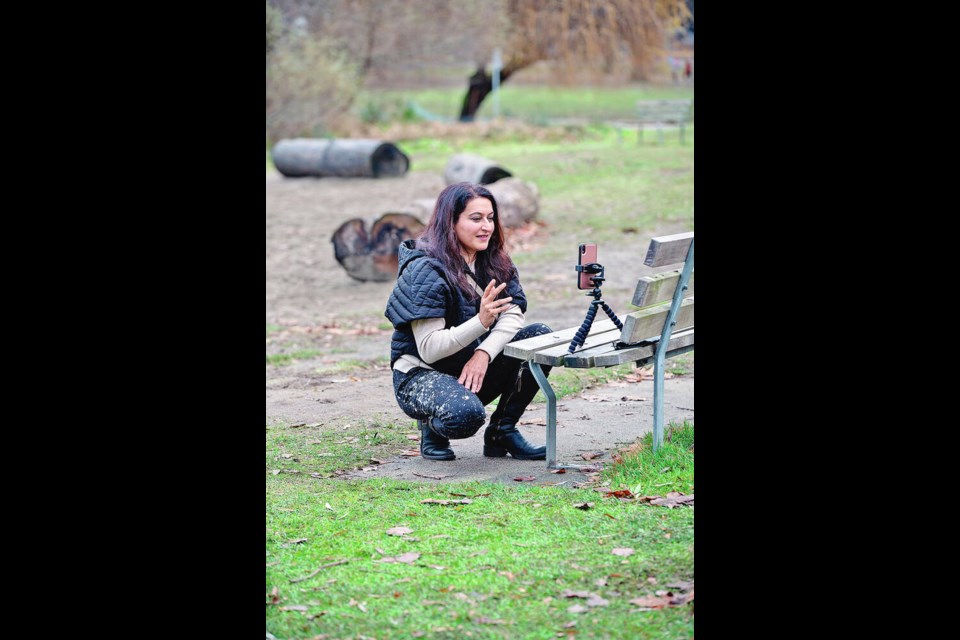Frustrated at being locked down and not able to continue his work during the first days of the pandemic, artist Adad Hanna grabbed his camera and took to the streets of his Burnaby neighbourhood with one goal in mind — to make art.
“I was feeling frustrated — just sitting at home reading the news,” said Hannah, a visual artist known for staging large-scale tableau-vivant videos that reference famous works of art, such as The Raft of the Medusa, shot in 100 Mile House, and a backyard version of Guernica.
“The pandemic had inhibited my creativity — a number of exhibits I was working collaboratively on were cancelled, so I put a long lens on my camera and headed out on foot.”
Hannah, who calls the Metrotown area of Burnaby home, walked the eerily empty streets toward the nearby shopping centre, asking people he encountered if they would be interested in being part of an art piece that included a static video portrait — a tableau vivant, or living picture — a still photograph and an account of their COVID-19 experiences.
“About half of the people I asked if they wanted their picture taken said no. I was actually surprised that 50 per cent said yes,” said Hannah.
The 237 portraits he ended up taking over the span of a year — from March 2020 to March 2021 — became a Royal B.C. Museum exhibit called Between Us: Adad Hanna’s Social Distancing Portraits, now compiled in a book set to be released May 5.
The series begins with the first weeks of uncertainty and records people’s reactions to the Black Lives Matter movement, then the slow return to work and school, culminating with the COVID-19 vaccine rollout.
One of the first people Hannah encountered on March 14, 2020 was a woman clutching a package of toilet paper — a rare find amid early panic-buying for the household staple.
Rather than merely capturing their images, Hannah asked his subjects to hold a pose for at least 30 seconds.
In his short videos, his subjects are immobile while the wind moves their clothing and life goes on around them — a visual depiction of humanity suspended in time as the world continues, unabated.
Hannah also took the time to talk to every subject, capturing a narrative of their experiences and emotional journeys.
“I wanted to see if I could capture this strange, tense, in-between moment. The project relied on the element of chance but enabled me to connect with my subjects,” said Hannah, who was born in New York City in 1971, spent his childhood in Israel and England and moved to Vancouver in the early 1980s.
He began to share his pandemic pictures and stories on his Instagram account (instagram.com/adadhannah), where they caught the eye of India Young, art and images curator at the Royal B.C. Museum.
“I was immediately drawn to the images, which I thought were a compelling reflection of the times,” said Young. “The stories were of everyday people who are undergoing an emotional journey and a lot of uncertainly.”
She contacted Hannah to secure his work to create an exhibit of the video portraits, which ran at the museum between May and November of 2022. (The travelling exhibit is not currently on display.)
“What sets the exhibition apart from others created in the aftermath of COVID-19 was that it was not just one moment during the pandemic,” said Young, who joined the museum in 2019. “Hannah records the roller-coaster of events — the first time a person returns home, the first time they return to work, of parents and teachers.
“He is hyper-focused on his location — yet the work is also universal, reflecting a global experience.”
The portraits and accompanying short interviews shine a light on the social isolation many endured and on the human need to connect.
Hannah, who first picked up a camera 25 years ago, said taking the pictures was a cathartic experience.
When he first started posting a few portraits on Instagram, “they seemed to resonate with people,” he said. “As the project grew, it began to get easier to engage with people and sped up the passing of time.”
He said he still bumps into some of his subjects in his neighbourhood and is struck by the change in the children, who were around 12 years old when he shot them and are now 15.
A few of his subjects — including a woman in a red housecoat who was out for a cigarette break when he captured her image — have passed away, reflecting the sense of loss from the pandemic.
“The good news is that I now know a lot more people,” said Hannah, who studied at Concordia University in Montreal and Emily Carr University of Art and Design in Vancouver, and whose works have been exhibited throughout North America, Europe, West Africa, Australia, Korea, China and Russia.
To add an extra dimension to the project, he worked with composers Brigitte Dajczer and Daniel Ingram in a sound studio to create individual soundscapes for each video tableau vivant, accessible via a QR code.
The project has drawn considerable interest from other museums, resulting in three or four online exhibitions along with the same number of physical exhibits.
“This project is just so full of heart,” said Young. “It reminds us of how we, as a society and as a country, really pulled together that first year in the pandemic. It is a compelling refection of the best of us.”
>>> To comment on this article, write a letter to the editor: [email protected]



